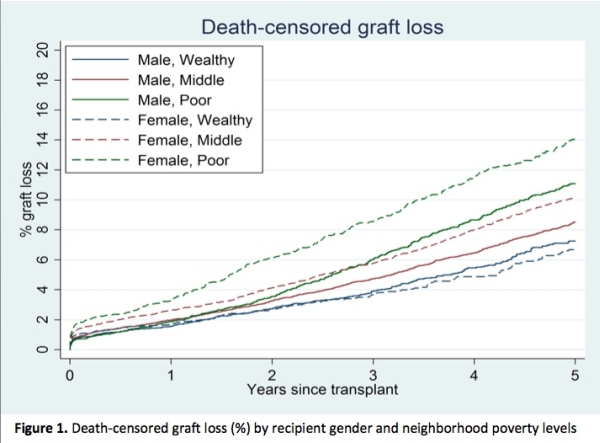Neighborhood Poverty Modifies Gender Disparities in Kidney Transplant Outcomes
Johns Hopkins, Baltimore.
Meeting: 2015 American Transplant Congress
Abstract number: 354
Keywords: Graft survival
Session Information
Session Name: Concurrent Session: Disparities in Donation and Transplant Outcomes
Session Type: Concurrent Session
Date: Tuesday, May 5, 2015
Session Time: 2:15pm-3:45pm
 Presentation Time: 3:15pm-3:27pm
Presentation Time: 3:15pm-3:27pm
Location: Room 115-C
Earlier studies report mixed findings comparing transplant outcomes in women versus men, and little is known about the association of socioeconomic status (SES) with gender differences in outcomes. We examined the relation of neighborhood poverty with gender differences in live donor kidney transplant (LDKT) outcomes in the US. METHODS: Using SRTR patient data linked with zip-code level US Census data, we performed Cox proportional hazards models to compare risk of death-censored graft loss within 5 years among 27,978 men and 17,263 women who received a first-time LDKT between January 1, 2005 and December 31, 2013. We adjusted models for recipient, donor, and center factors, and we tested whether neighborhood poverty modified the association of gender with graft survival. We defined neighborhood poverty levels as poor (≥20% poverty), middle-income (5-19% poverty), and wealthy (<5% poverty) neighborhoods. RESULTS: Overall, women were 24% more likely to experience death-censored graft loss than men (aHR: 1.24, 95% CI: 1.14-1.35, p<0.001), but risk of graft loss varied by neighborhood poverty level (p for gender/poverty interaction = 0.047). Women living in poor (aHR: 1.34, 95% CI: 1.16-1.55, p<0.001) and middle-income (aHR: 1.26, 95% CI: 1.13-1.40, p<0.001) neighborhoods had higher risk of death-censored graft loss than men, but there were no gender differences among recipients living in wealthy neighborhoods (aHR: 1.00, 95% CI: 0.81-1.23, p<0.001). (Figure 1) CONCLUSIONS: Women living in poor neighborhoods were at highest risk of kidney graft loss. Targeted efforts to address SES-related barriers among women living in poorer neighborhoods may help mitigate gender disparities in transplant outcomes. 
To cite this abstract in AMA style:
Purnell T, Luo X, Massie A, Crews D, Cooper L, Segev D. Neighborhood Poverty Modifies Gender Disparities in Kidney Transplant Outcomes [abstract]. Am J Transplant. 2015; 15 (suppl 3). https://atcmeetingabstracts.com/abstract/neighborhood-poverty-modifies-gender-disparities-in-kidney-transplant-outcomes/. Accessed February 25, 2026.« Back to 2015 American Transplant Congress
